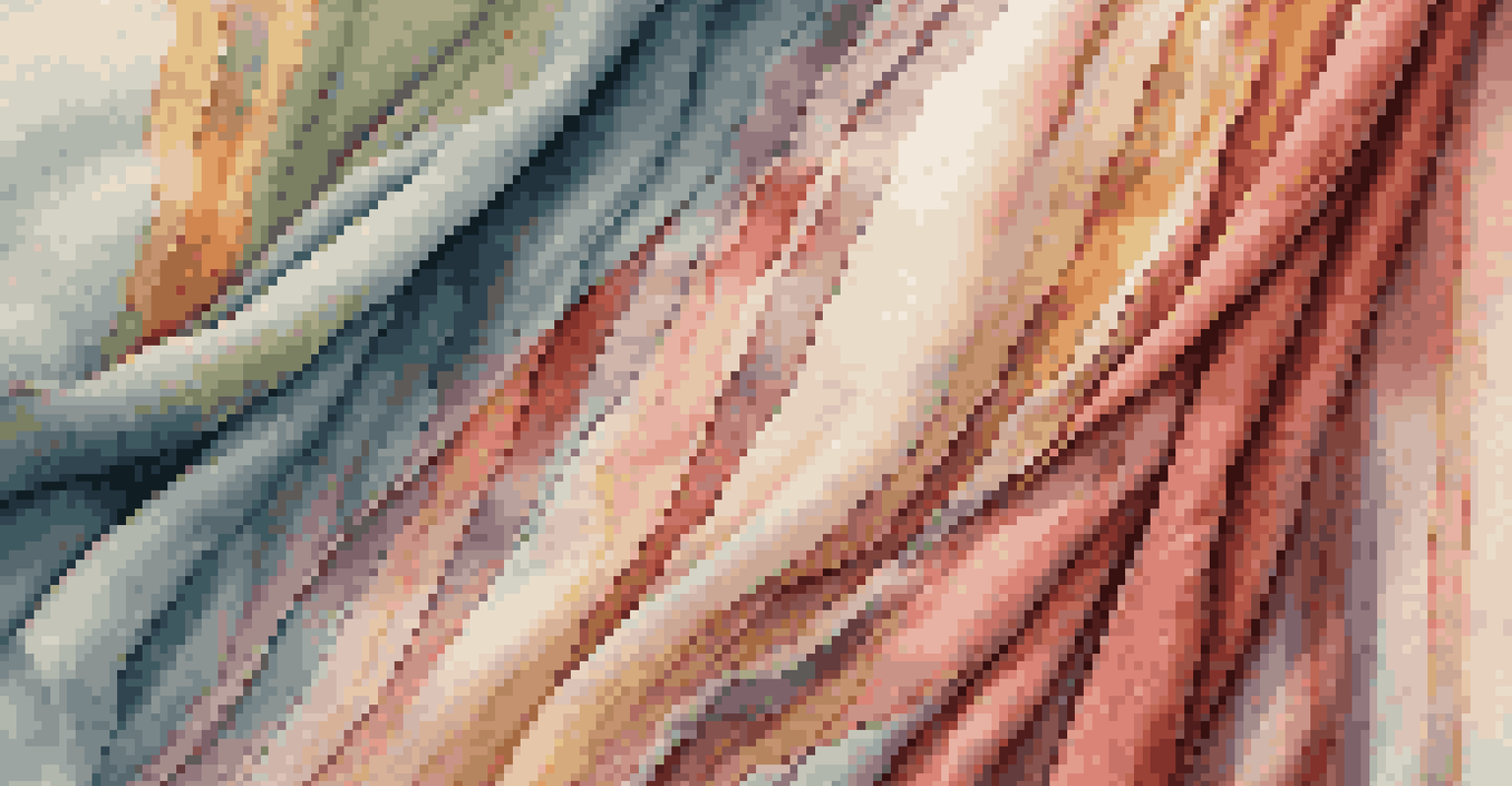Exploring Ethical Practices in Luxury Fashion Production

The Growing Demand for Ethical Fashion in Luxury Markets
In recent years, consumers have become more conscious of the impact their purchases have on the world. The luxury fashion sector, often perceived as elitist, is now facing pressure to adopt ethical practices. This shift is largely driven by younger generations who prioritize sustainability and ethics in their shopping habits.
Fashion is the armor to survive the reality of everyday life.
Brands that traditionally focused solely on exclusivity are now incorporating transparency into their business models. This includes sharing information about sourcing materials, labor practices, and environmental impact. When luxury brands embrace these changes, they not only appeal to a broader audience but also contribute to a more sustainable future.
As a result, the luxury fashion industry is witnessing a transformation that aligns high-end aesthetics with responsible production. This evolution signifies that luxury and ethics can coexist, paving the way for a new era of fashion that respects both artisans and the environment.
Understanding Sustainable Materials in Luxury Fashion
Sustainable materials are at the forefront of ethical luxury fashion. Brands are increasingly opting for organic cotton, recycled fabrics, and even innovative materials like Tencel, which is made from sustainably sourced wood pulp. These choices not only lessen environmental impact but also offer unique textures and styles.

Moreover, many luxury brands are investing in research to develop new eco-friendly materials. For instance, innovative designs might incorporate biodegradable fabrics or vegan leathers, appealing to consumers looking for guilt-free luxury. By prioritizing sustainability, brands can create a positive narrative that resonates with ethical shoppers.
Ethical Fashion Gains Popularity
The luxury fashion sector is increasingly adopting ethical practices as consumers, particularly younger generations, prioritize sustainability in their purchases.
The use of sustainable materials also challenges the misconception that luxury is synonymous with excess. Instead, it showcases how luxury can be redefined through mindful choices, proving that style and substance can go hand in hand.
Ethical Labor Practices: A Core Component of Luxury Fashion
Ethical labor practices are crucial in ensuring the welfare of workers in the luxury fashion supply chain. This includes fair wages, safe working conditions, and respect for workers' rights. Many consumers now actively seek out brands that uphold these values and are willing to pay a premium for ethically produced items.
Sustainability is not a trend; it's a way of life.
Luxury brands are increasingly partnering with organizations that promote fair trade and responsible labor practices. By fostering strong relationships with artisans and workers, these brands create a sense of community and shared responsibility. This not only enhances the quality of the products but also builds a powerful story around each item.
Ultimately, prioritizing ethical labor practices allows luxury brands to differentiate themselves in a crowded market. It cultivates loyalty among consumers who value transparency and integrity, reinforcing the idea that luxury can also mean compassion.
The Role of Transparency in Luxury Fashion Operations
Transparency is becoming an essential aspect of luxury fashion, as consumers demand to know where and how their products are made. Brands are now sharing detailed information about their supply chains, from raw material sourcing to the final product. This shift fosters trust and accountability, encouraging consumers to support brands that align with their values.
Many luxury brands are adopting certifications and partnerships with organizations that verify their ethical practices. These third-party endorsements provide consumers with confidence that they are making responsible choices. For instance, certifications like Fair Trade or GOTS (Global Organic Textile Standard) help validate a brand's commitment to sustainability.
Sustainable Materials Matter
Luxury brands are increasingly using sustainable materials like organic cotton and recycled fabrics, redefining luxury through mindful production choices.
By embracing transparency, luxury fashion brands not only enhance their reputation but also contribute to a more ethical industry standard. This openness invites consumers to engage with brands on a deeper level, promoting informed purchasing decisions.
Consumer Responsibility: Making Informed Choices in Luxury Fashion
As consumers, we play a pivotal role in shaping the future of luxury fashion. By making informed choices, we can support brands that prioritize ethical production practices. This means looking beyond the label and considering the story behind each item—who made it, where it came from, and the materials used.
One way consumers can exercise their responsibility is by researching brands before making a purchase. Many retailers provide detailed information on their websites about sustainability practices, supply chains, and labor policies. Being proactive in understanding these aspects empowers consumers to advocate for ethical fashion.
In essence, consumer responsibility extends beyond individual purchases; it reflects a collective movement towards a more sustainable and ethical fashion industry. By championing brands that align with our values, we contribute to a positive change in the luxury fashion landscape.
The Impact of Technology on Ethical Fashion Production
Technology is revolutionizing the luxury fashion industry, particularly in terms of ethical production. Innovations such as blockchain are enabling brands to track their supply chains transparently, ensuring that every step of the process adheres to ethical standards. This level of traceability is appealing to consumers who want assurance about their purchases.
Additionally, advancements in manufacturing processes are reducing waste and energy consumption. For instance, 3D printing allows for on-demand production, minimizing unsold inventory and its environmental impact. Such technologies not only enhance efficiency but also align with the principles of sustainability.
Transparency Builds Consumer Trust
As consumers demand transparency in production, luxury brands are sharing detailed supply chain information to foster trust and encourage informed purchasing.
By harnessing technology, luxury fashion brands can create a more responsible production model. This not only elevates their brand image but also resonates with a growing demographic of eco-conscious consumers who appreciate innovative solutions to age-old industry challenges.
Future Trends: Where is Ethical Luxury Fashion Heading?
As the luxury fashion landscape continues to evolve, the trend towards ethical practices is only expected to grow. More brands are recognizing the importance of sustainability and ethics as core components of their identity. This shift is not just a passing fad; it represents a fundamental change in the way fashion is perceived and produced.
Future trends may include increased collaboration between luxury brands and ethical organizations, leading to more impactful initiatives. We might also see a rise in upcycled fashion, where waste materials are transformed into high-end products, further reducing environmental impact.

Ultimately, the future of luxury fashion looks promising as it embraces ethical practices. By prioritizing sustainability, transparency, and community, the industry can pave the way for a more responsible and stylish future.